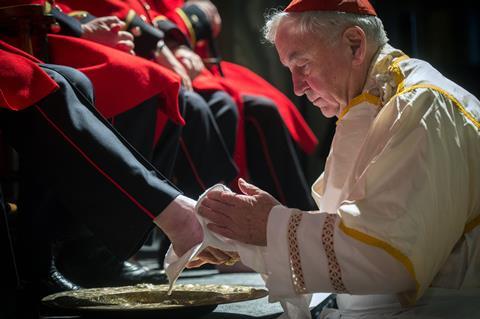The roots of the oddly-named Thursday before Easter come from Jesus’ command to love one another, as well as his foot-washing example, explains Karen Murdarasi

“A new commandment I give you, that you love one another; just as I have loved you, so you are to love one another” (John 13:34).
Strange as it may seem, these words, spoken by Jesus on the evening of the Last Supper, are the origin of the name ‘Maundy Thursday’. In the Vulgate translation of the Bible, the Latin for “a new commandment” was mandatum novum. This word entered Old French, where it became mandé, eventually giving us the English ‘maundy’.
What’s in a name?
In the UK - and especially in England - the Thursday immediately before Easter is called Maundy Thursday. But it has lots of different names throughout the world. Holy Thursday is a common one, for obvious reasons. Clean Thursday is used in some languages, either because Jesus washed his disciples’ feet before they ate their Passover meal, or on account of Christians cleaning the house in preparation for Easter. In English-speaking countries it is sometimes called Shere (or Sheer) Thursday, another word meaning ‘clean’ or ‘bright’.
The tradition of foot-washing makes a lot less sense in chilly Britain than it did in first century Judea
In Germany, it is called Gründonnerstag, which translates as Green Thursday. You can find all kinds of explanations for this, ranging from a tradition of giving palm branches to those who had just completed their Lenten penitence, to the Garden of Gethsemane being a green space, to the tradition of eating green vegetables on this day (presumably because of the Lenten fast). In reality, Gründonnerstag is more likely to be derived from the High German word gronan meaning to whine or cry – Mournday Thursday, if you like.
Word and deed
In the UK, it is not only the day that is called Maundy, but also the religious duty of charity that was traditionally performed. That didn’t simply mean giving financial aid to the poor, it also meant washing their feet – literally.
On the night before the crucifixion, Jesus demonstrated humility by washing his disciples’ feet, and said that his followers should follow this example. Since at least the fourth century AD, services of foot-washing have been held on the day before Good Friday, with clergy humbling themselves by washing the feet of their congregants.
This tradition continues today, with many branches of the Church holding foot-washing services. However, in medieval England, the tradition of humility was taken to its ultimate extreme, with the monarch washing the feet of his subjects.
A royal tradition
The tradition of royal Maundy dates back to at least the 13th century. Throughout the following centuries it was the custom of the English monarch to wash the feet of the poor on Maundy Thursday and distribute purses of alms (charitable giving).
This was historically done in London, but Queen Elizabeth II decided to widen the custom. During her long reign, she took part in at least one Maundy Thursday service at every cathedral in England, as well as St Patrick’s Cathedral in Northern Ireland and St David’s Cathedral in Wales.
Today, Queen Camilla will take the place of King Charles at the Maundy Thursday service at Worcester Cathedral. However, although her attendants will still be girded with the traditional linen towel, the present-day Queen need not worry about getting her hands wet; since around 1730, foot-washing by monarchs has been dropped; only the distribution of alms continues.
Jesus demonstrated humility by washing his disciples’ feet, and said his followers should do the same
Today, 75 men and 75 women (the number matches the age of the monarch) will be presented with two small leather purses containing money. The recipients are pensioners, chosen for their service to the Church and community. The monetary amount is insignificant – one purse contains £5.50 for clothes and food (in the past, the monarch would actually have given clothes) while the other contains silver pennies to the amount of the monarch’s age. While 75p is not much by anyone’s standards, these coins are specially minted for the ceremony, so have sentimental and commemorative value.
Many Christians attend communion services today, in remembrance of Jesus’ last Passover meal with his disciples. The tradition of foot-washing to accompany this makes a lot less sense in chilly Britain, where we are still wearing thick winter socks, than in dusty, first-century Judea.
But perhaps it is a shame that we have lost this custom. Maundy was a new commandment, and it is now a very old one, but the duty to love one another in deed as well as word is something to hold on to.





































No comments yet